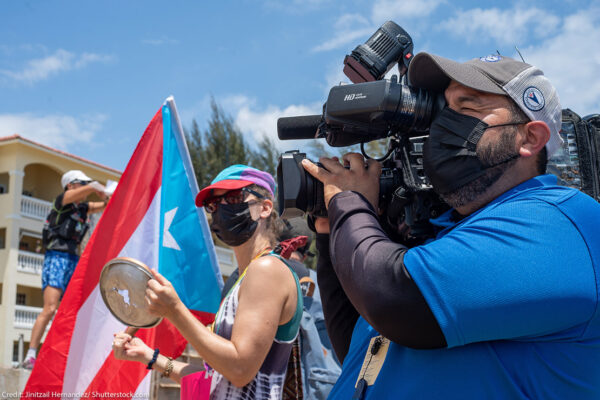ACLU of Hawaii Invokes "Media Shield" Law in Defense of Documentary Filmmaker
To ensure a vibrant and independent media, ACLU takes case to protect journalist from legal "fishing expedition"
FOR IMMEDIATE RELEASE
CONTACT: media@aclu.org
HONOLULU – The American Civil Liberties Union of Hawaii ("ACLU") and Honolulu attorney James J. Bickerton (of Bickerton Lee Dang & Sullivan) announced today that they will use Hawaii's new "media shield" law to protect a documentary filmmaker's work from sweeping subpoenas issued by a private homeowner over a land-use dispute on Kauai.
Plaintiff Keoni Kealoha Alvarez is an independent filmmaker who has spent the last two years preparing a documentary about Native Hawaiian burial practices. Alvarez has spent countless hours conducting confidential interviews with kupuna, university professors, Kamehameha Schools trustees, Office of Hawaiian Affairs officials, experts from the Bishop Museum, and other community leaders.
In preparing this documentary, Alvarez was unwittingly drawn into a legal battle over the construction of Joseph A. Brescia's home on Naue Point on Kauai. Brescia discovered approximately 30 graves on the property and, for the last eight years, has fought with the Kauai/Niihau Island Burial Council, the Kauai Planning Commission, and Kauai residents – ultimately losing his case in the Hawaii Supreme Court.
Brescia is now pursuing a civil lawsuit against individuals he claims allegedly delayed construction on his property. In a search for relevant evidence, Brescia's attorneys have issued a sweeping subpoena demanding nearly all of Alvarez's unpublished interviews and raw video footage.
Bickerton said: "Alvarez's unpublished documentary footage is clearly protected by law against disclosure under Hawaii's 'media shield.' The law restricts attorneys from using the subpoena power of the court to compel protected information from journalists. Just as we expect and protect doctor-patient confidentiality because it fosters trust and healthy outcomes, journalists have, under the law, the same right to protect the confidentiality of their sources and unpublished materials.
This trust allows for a diverse, robust and independent media, which in turn gives us a more accountable and transparent system of government."
Alvarez explained, "As a journalist, I am trying to be as pono as I can in producing this film. I have promised everyone complete confidentiality, and I have promised everyone that the film and the interviews will not be released publicly until everyone in it has had a chance to review, comment, or object. Material that doesn't make it into the final published film is intended to remain confidential."
"The documentary deals with Hawaiian belief systems, burial practices, and issues that many people consider to be kapu," Alvarez continued to say: "If I'm forced to turn over these tapes we'll never be able to do a project like this again – lots of really important Hawaiian cultural preservation work simply won't happen because people will be too afraid to do it. The trust in the journalist will be destroyed."
Daniel Gluck, ACLU senior staff attorney, stated, "Hawaii's media shield law is designed to create an environment in which journalists like Alvarez can take on difficult and sensitive projects without having to fear court actions undermining their integrity. This case is about defending all media voices to make sure that attorneys cannot abuse the court's power – and cannot compromise journalistic integrity – just to 'fish' for information."
Attorney Bickerton was more direct: "Simply put, Brescia has no right to these materials. If he can't see that by reading the new law, we will ask the court to explain it to him."
Alvarez received a commendation from Governor Linda Lingle in 2005 for his accomplishments in helping to preserve Hawaiian culture.
In July 2008, Hawaii became the forty-ninth state (plus the District of
Columbia) to pass a media shield law.


